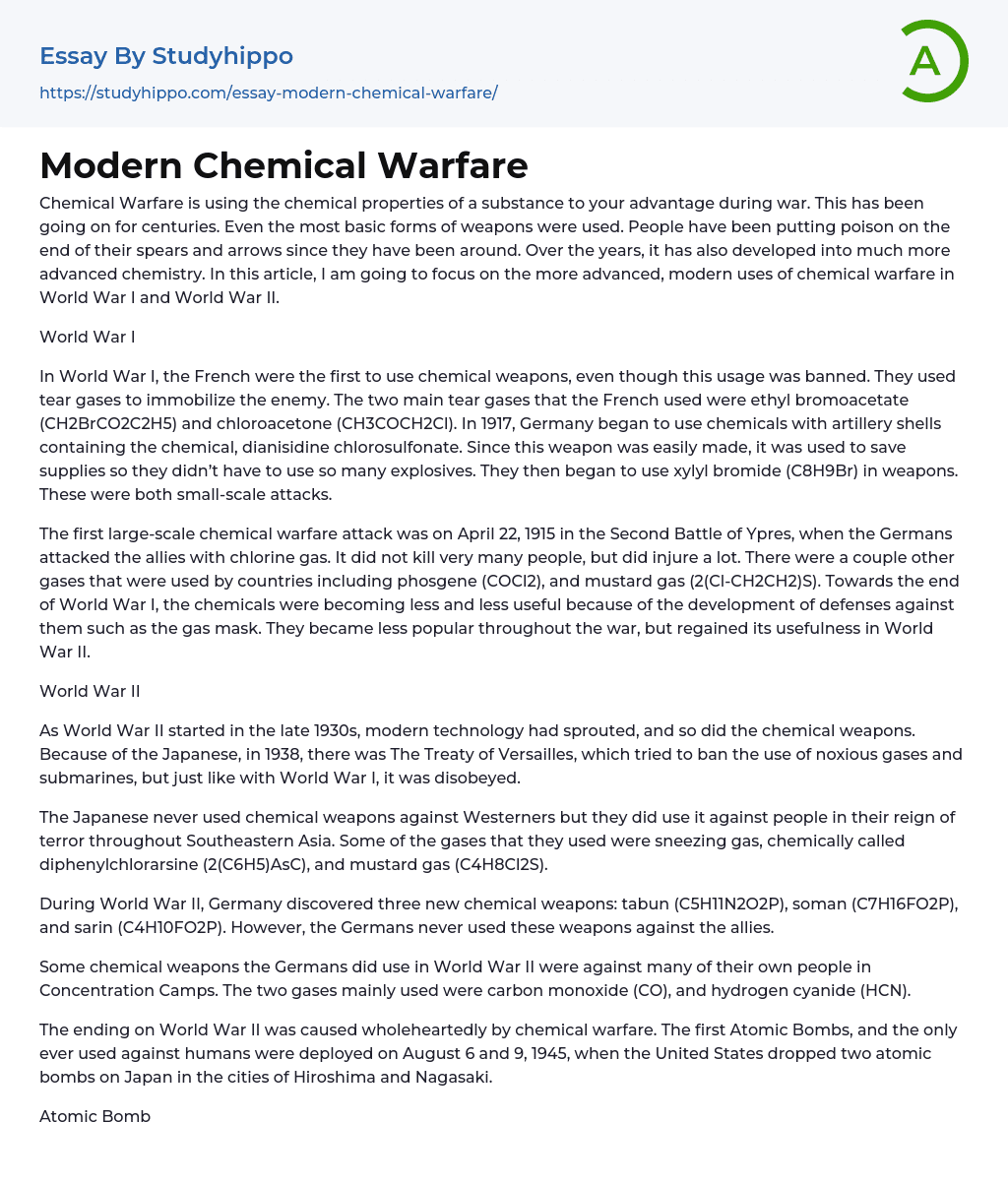Chemical Warfare is using the chemical properties of a substance to your advantage during war. This has been going on for centuries. Even the most basic forms of weapons were used. People have been putting poison on the end of their spears and arrows since they have been around. Over the years, it has also developed into much more advanced chemistry. In this article, I am going to focus on the more advanced, modern uses of chemical warfare in World War I and World War II.
World War I
In World War I, the French were the first to use chemical weapons, even though this usage was banned. They used tear gases to immobilize the enemy. The two main tear gases that the French used were ethyl bromoacetate (CH2BrCO2C2H5) and chloroacetone (CH3COCH2Cl).
...In 1917, Germany began to use chemicals with artillery shells containing the chemical, dianisidine chlorosulfonate. Since this weapon was easily made, it was used to save supplies so they didn’t have to use so many explosives. They then began to use xylyl bromide (C8H9Br) in weapons. These were both small-scale attacks.
The first large-scale chemical warfare attack was on April 22, 1915 in the Second Battle of Ypres, when the Germans attacked the allies with chlorine gas. It did not kill very many people, but did injure a lot. There were a couple other gases that were used by countries including phosgene (COCl2), and mustard gas (2(Cl-CH2CH2)S). Towards the end of World War I, the chemicals were becoming less and less useful because of the development of defenses against them such as the gas mask. They became les
popular throughout the war, but regained its usefulness in World War II.
World War II
As World War II started in the late 1930s, modern technology had sprouted, and so did the chemical weapons. Because of the Japanese, in 1938, there was The Treaty of Versailles, which tried to ban the use of noxious gases and submarines, but just like with World War I, it was disobeyed.
The Japanese never used chemical weapons against Westerners but they did use it against people in their reign of terror throughout Southeastern Asia. Some of the gases that they used were sneezing gas, chemically called diphenylchlorarsine (2(C6H5)AsC), and mustard gas (C4H8Cl2S).
During World War II, Germany discovered three new chemical weapons: tabun (C5H11N2O2P), soman (C7H16FO2P), and sarin (C4H10FO2P). However, the Germans never used these weapons against the allies.
Some chemical weapons the Germans did use in World War II were against many of their own people in Concentration Camps. The two gases mainly used were carbon monoxide (CO), and hydrogen cyanide (HCN).
The ending on World War II was caused wholeheartedly by chemical warfare. The first Atomic Bombs, and the only ever used against humans were deployed on August 6 and 9, 1945, when the United States dropped two atomic bombs on Japan in the cities of Hiroshima and Nagasaki.
Atomic Bomb
Inside the atomic bomb, there is fission, or dividing, of nuclei of specific isotopes of uranium and plutonium. It is as powerful as thousands of tons of TNT, otherwise known as Trinitrotoluene (C7H5(NO2)3). Collisions between neutrons and the atoms of uranium and plutonium cause the atoms to split into pairs
of nuclear fragments releasing energy and more neutrons.
The newly released neutrons hit other atoms, continuing many more fission reactions until the material is too scattered and cannot continue. The intense explosion is a release of enormous amounts of energy in the form of heat and a massive shockwave. The damage occurred is almost unimaginable, with pressure waves, flash burns, high winds, and a deadly radiation in the form of gamma rays and neutrons. Living matter is destroyed, and soil and water are contaminated also.
- Organic Chemistry essays
- Acid essays
- Calcium essays
- Chemical Bond essays
- Chemical Reaction essays
- Chromatography essays
- Ethanol essays
- Hydrogen essays
- Periodic Table essays
- Titration essays
- Chemical reactions essays
- Osmosis essays
- Carbohydrate essays
- Carbon essays
- Ph essays
- Diffusion essays
- Copper essays
- Salt essays
- Concentration essays
- Sodium essays
- Distillation essays
- Amylase essays
- Magnesium essays
- Acid Rain essays
- John Locke essays
- 9/11 essays
- A Good Teacher essays
- A Healthy Diet essays
- A Modest Proposal essays
- A&P essays
- Academic Achievement essays
- Achievement essays
- Achieving goals essays
- Admission essays
- Advantages And Disadvantages Of Internet essays
- Alcoholic drinks essays
- Ammonia essays
- Analytical essays
- Ancient Olympic Games essays
- APA essays
- Arabian Peninsula essays
- Argument essays
- Argumentative essays
- Art essays
- Atlantic Ocean essays
- Auto-ethnography essays
- Autobiography essays
- Ballad essays
- Batman essays
- Binge Eating essays




